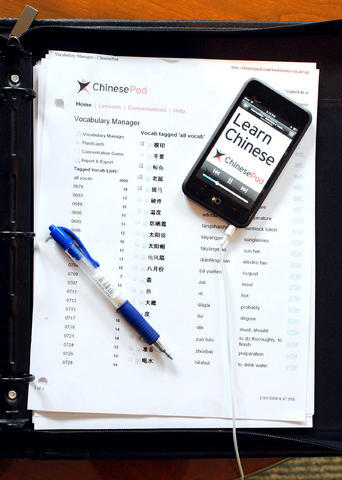The best way to learn a foreign language may be to surround yourself with native speakers. But if you can't manage a trip abroad, the Internet and a broadband computer connection may do the job, bringing native speakers within electronic reach for hours of practice.
Web-based services now on the market let people download a daily lesson in French or Hindi, pop on their headsets, and then use Internet telephone services and the power of social networks to try their conversational skills with tutors or language partners from around the world.
For those who want to polish their high-school German before a vacation, or to master snippets of well-intoned Mandarin Chinese to charm a future business host in Shanghai, these sites offer alternatives to more traditional tools like textbooks and CD-ROMs. LiveMocha (livemocha.com), for example, is a free site where members can tackle 160 hours of beginning or intermediate lessons in French, German, Mandarin Chinese, Spanish, Hindi or English. There is no charge for tutoring; instead, members tutor one another, drawing on their expertise in their own native language.

PHOTO: NY TIMES NEWS SERVICE
Members chat online by typing messages, by talking or, if they have a Webcam, by video, in exchanges with others who want to tutor or be tutored. English speakers learning Spanish, for example, can write or speak descriptions of a vacation and receive feedback on their grammar and choice of idioms from native Spanish speakers on the network. A Spanish speaker, in turn, may seek advice from the English speaker about English assignments.
LiveMocha introduced its Web site in late September last year, said Shirish Nadkarni, chief executive of the company, which is based in Bellevue, Washington. Since then, he said, about 200,000 users from more than 200 countries have joined.
"It's a community of like-minded learners who can leverage their native language proficiency to help one another," he said.

PHOTO: NY TIMES NEWS SERVICE
The name "LiveMocha" is meant to evoke the relaxed atmosphere of a coffee shop.
The site is still in beta, or testing, phase, Nadkarni said. Advertising will soon be added, as well as charges for some premium content and services.
Paul Aoki, director of the language learning center at the University of Washington, Seattle, signed up at LiveMocha primarily to see if his students might benefit. He says he thinks the site's social networking component makes it useful.
"It seems to be a pretty powerful opportunity for people around the world to connect with language partners," he said.
"Doing voice and text chat simultaneously is very useful," he said. "If you don't understand something your language partner is saying," he said, even when people at the other end speak slowly, "they can type it out and you can read it."
Curtis Bonk, a professor of education at Indiana University in Bloomington, is specializing in ways to integrate online technologies into teaching. He says LiveMocha is part of an explosion of educational resources for language learning on the Web.
"You no longer have to learn language as an individual in a silo somewhere, using a canned program on a CD-ROM," he said. "Instead, you have thousands of tutors to pick from -- if the first one doesn't work out, you can choose another."
Another electronic-based language learning program takes a different approach: podcasting.
Praxis Language, based in Shanghai, offers free lessons in Mandarin (ChinesePod.com) or Spanish (SpanishPod.com) as podcasts.
Many lessons include business-based vocabulary on topics like how to hire a courier in China, said Ken Carroll, a co-founder of Praxis. While the podcasts are free, transcripts, exercises and other services typically cost $9 to $30 a month, he said. For $200 a month, members can receive daily tutoring from professional, native-speaking teachers by way of Skype, the Internet-based telephone service.
Carroll says ChinesePod has more than 270,000 visitors a month, several thousand of them paying about $240 a year for a combination of premium services. Most of the paying customers live in the US, he said.
"They tend to be thirty-somethings, slightly mature, with some kind of business connection to China," he said.
Mike Kuiack, an investment banker in Vancouver, British Columbia, who often travels to China, was an off-and-on student of Chinese for eight and a half years before he signed on to ChinesePod. He has since been studying diligently for a year and a half, paying about $240 a year for premium services.
Since he started using the service, he said, his vocabulary has grown as much as it did in all of the previous years of study combined.
"Speaking and listening skills were what I needed," he said. "The podcasts have been very useful for this. Part of the reason I've made so much progress is that they are so enjoyable."
He works on lessons whenever he has a moment.
"I listen when I'm stuck in traffic," he said, "and also at my PC, where I can listen and read at the same time."
The studying is starting to pay off at work.
"I don't try to conduct negotiations in Chinese," he said, "but now at least I can listen to what's going on in meetings."

DAREDEVIL: Honnold said it had always been a dream of his to climb Taipei 101, while a Netflix producer said the skyscraper was ‘a real icon of this country’ US climber Alex Honnold yesterday took on Taiwan’s tallest building, becoming the first person to scale Taipei 101 without a rope, harness or safety net. Hundreds of spectators gathered at the base of the 101-story skyscraper to watch Honnold, 40, embark on his daredevil feat, which was also broadcast live on Netflix. Dressed in a red T-shirt and yellow custom-made climbing shoes, Honnold swiftly moved up the southeast face of the glass and steel building. At one point, he stepped onto a platform midway up to wave down at fans and onlookers who were taking photos. People watching from inside

MAKING WAVES: China’s maritime militia could become a nontraditional threat in war, clogging up shipping lanes to prevent US or Japanese intervention, a report said About 1,900 Chinese ships flying flags of convenience and fishing vessels that participated in China’s military exercises around Taiwan last month and in January last year have been listed for monitoring, Coast Guard Administration (CGA) Deputy Director-General Hsieh Ching-chin (謝慶欽) said yesterday. Following amendments to the Commercial Port Act (商港法) and the Law of Ships (船舶法) last month, the CGA can designate possible berthing areas or deny ports of call for vessels suspected of loitering around areas where undersea cables can be accessed, Oceans Affairs Council Minister Kuan Bi-ling (管碧玲) said. The list of suspected ships, originally 300, had risen to about

A Vietnamese migrant worker yesterday won NT$12 million (US$379,627) on a Lunar New Year scratch card in Kaohsiung as part of Taiwan Lottery Co’s (台灣彩券) “NT$12 Million Grand Fortune” (1200萬大吉利) game. The man was the first top-prize winner of the new game launched on Jan. 6 to mark the Lunar New Year. Three Vietnamese migrant workers visited a Taiwan Lottery shop on Xinyue Street in Kaohsiung’s Gangshan District (崗山), a store representative said. The player bought multiple tickets and, after winning nothing, held the final lottery ticket in one hand and rubbed the store’s statue of the Maitreya Buddha’s belly with the other,

Japan’s strategic alliance with the US would collapse if Tokyo were to turn away from a conflict in Taiwan, Japanese Prime Minister Sanae Takaichi said yesterday, but distanced herself from previous comments that suggested a possible military response in such an event. Takaichi expressed her latest views on a nationally broadcast TV program late on Monday, where an opposition party leader criticized her for igniting tensions with China with the earlier remarks. Ties between Japan and China have sunk to the worst level in years after Takaichi said in November that a hypothetical Chinese attack on Taiwan could bring about a Japanese